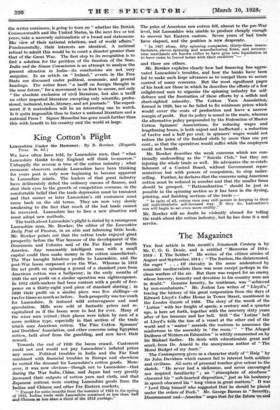King Cotton's Plight
Lancashire Under the Hammer. By B. Bowker. (Hogarth Press. 3s. 6d.) WE have often been told, by Lancashire men, that " what Lancashire think9 to-day England will think to-morrow." Unhappily the reverse is true of the cotton industry ; what economic observers outside Lancashire have been thinking for years past is only now beginning to become apparent to Lancashire minds. The leaders of that great industry have deliberately defied the ordinary canons of finance, and shut their eyes to the growth of competition overseas, in the comfortable belief that the trade depression must be transient and that sooner or later Lancashire's old customers must come back on the old terms. They are now very slowly awakening to the fact that much of the lost trade cannot be recovered Lancashire has to face a new situation and
must adopt new methods.
The truth about Lancashire's plight is stated by a courageous
Lancashire man, Mr. Bowker, the editor of the Lancashire Daily Post of Preston, in an able and informing little book.
Mr. Bowker points out that the cotton trade enjoyed great prosperity before the War because of the development of the Dominions and Colonies and of the Far East and South America. Any reasonably intelligent man with a small capital could then make money in the cotton manufacture. The War brought fabulous profits to Lancashire, and the
post-War boom surpassed even the War. Whereas. in 1912 the net profit on spinning a pound of a standard yarn from American cotton was a halfpenny, in the early months of 1920 the net profit on a similar operation was eighteenpenee. In 1912 cloth-makers had been content with a profit of five- pence on a thirty-eight yard piece of standard shirting ; in
1920 their profit on a similar piece was five shillings—or twelve times as much as before. Such prosperity was too much
for Lancashire It induced wild extravagance and mad speculation. Mills were sold at fantastic prices and re- capitalized as if the boom were to last for ever. Many of the wiser men retired ; their places were taken by men of a more reckless type, especially in that section of the trade which uses American_ cotton. The Fine Cotton . Spinners' and Doublers' ASsociation, and other concerns using Egyptian
cotton, held aloof from the gambling, and now have their reward.
Towards the end of 1920 the boom ceased. Customers could not and would not pay Lancashire's inflated prices any more. Political troubles in India and the Far East combined with financial troubles in Europe and elsewhere to curtail the demand for Lancashire's cotton goods. More- over, it was now obvious—though not to Lancashire—that during the War India, China, and Japan had very greatly increased their outputs of cotton yarn and cloth, and that Japanese cottons-, were ousting Lancashire goods from the
Indian and Chinese and other Far Eastern markets.
"" Except for sortie monthi from the Sunither of 1924 to the spring of 1925, Indian trade with Lancashire remained at lees than hal/ and:Chinese at less than a third of the 1913 yardage." The price of American raw cotton fell, almost to the pre-War level; hilt Lancashire was unable to produce cheaply enough to recover her Eastern custom. Seven years of bad trade have elapsed, and = the position is nnw desperate.
" In 1927 alone, fifty spinning companies,. thirty-three menu- lecturers, eleven spinning and manufacturing firms, and seventy- nine merchants are known either to have gone into liquidation or to have wale to forced terms- with their creditdrs "--
and there are others.
Mr. Bowker explains clearly- bow bad financing has aggra- vated Lancashire's troubles, and how the banks have been led to make such large advances as to -compel them to secure
control of many concerns. But the most significant pages of his book are those in which he describes the efforts of a few enlightened men to organize the spinning industry for self- defence • and the frustration of these efforts by a selfish and short-sighted minority. The Cotton Yarn Association, formed in 1926, has so far failed to fix minimum prices which would cover the costs of production and leave a narrow margin of profit. But its policy is sound in the main, whereas the alternative policy propounded by the Federation of Master
Cotton Spinners' Associations, for reducing wages and lengthening hours, is both unjust and ineffectual.; a reduction
of twelve and a half per cent. in spinners' wages would not reduce the price of the finished cloth by more than one per cent., so that the operatives would suffer while the employers could not benefit.
Mr. Bowker describes the weak concerns which are con- tinually underselling as the " Suicide Club," but they are
injuring the whole trade as well. He advocates the re-estab- lislunent of a Control Board, without Government repre- sentatives but with powers of compulsion, to stop under- selling. Further, he declares that the concerns using American
cotton must be reduced in number and that the smaller firms should be grouped. " Rationalization " should be just as possible in the spinning section as it has been in the dyeing, printing, and finishing sections of the trade :--
" In spite of all, cotton men may still persist in keeping to their old individualistic self-licensed way. If they do, 'Lancashire's sun will begin to set even more swiftly."
Mr. Bowker will no doubt be violently abused for telling the truth about the cotton industry, but he has done it a real service.


























































 Previous page
Previous page